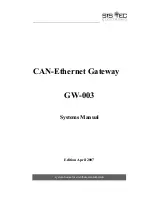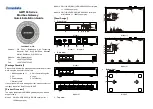
Chapter 6 AP Controller Mode
NWA-3166 User’s Guide
85
The following table describes the labels in this screen.
Table 14
The Profile Edit > Radio > Edit Screen
LABEL
DESCRIPTION
Profile Name
Enter a name identifying this profile.
802.11 Mode
Select 802.11b to allow only IEEE 802.11b compliant WLAN
devices to associate with the NWA.
Select 802.11g to allow only IEEE 802.11g compliant WLAN
devices to associate with the NWA.
Select 802.11b/g to allow both IEEE802.11b and IEEE802.11g
compliant WLAN devices to associate with the NWA. The
transmission rate of your NWA might be reduced.
Select 802.11a to allow only IEEE 802.11a compliant WLAN
devices to associate with the NWA.
Select 802.11n/g to allow only IEEE 802.11n and IEEE 802.11g
compliant WLAN devices to associate with the NWA.
Select 802.11n/a to allow only IEEE 802.11n and IEEE 802.11a
compliant WLAN devices to associate with the NWA.
Super Mode
Select this to improve data throughput on the WLAN by enabling
fast frame and packet bursting.
Choose Channel ID
Set the operating frequency/channel depending on your
particular region.
To manually set the NWA to use a channel, select a channel from
the drop-down list box.
RTS/CTS Threshold
(Request To Send) The threshold (number of bytes) for enabling
RTS/CTS handshake. Data with its frame size larger than this
value will perform the RTS/CTS handshake. Setting this attribute
to be larger than the maximum MSDU (MAC service data unit)
size turns off the RTS/CTS handshake. Setting this attribute to its
smallest value (256) turns on the RTS/CTS handshake. Enter a
value between 256 and 2346.
Fragmentation
Threshold
The threshold (number of bytes) for the fragmentation boundary
for directed messages. It is the maximum data fragment size that
can be sent. Enter an even number between 256 and 2346.
Beacon Interva
When a wirelessly networked device sends a beacon, it includes
with it a beacon interval. This specifies the time period before the
device sends the beacon again. The interval tells receiving
devices on the network how long they can wait in low-power
mode before waking up to handle the beacon. This value can be
set from 30ms to 1000ms. A high value helps save current
consumption of the access point.
DTIM
Delivery Traffic Indication Message (DTIM) is the time period
after which broadcast and multicast packets are transmitted to
mobile clients in the Active Power Management mode. A high
DTIM value can cause clients to lose connectivity with the
network. This value can be set from 1 to 100.
Summary of Contents for NWA-3166
Page 2: ......
Page 15: ...15 PART I Introduction Introduction 17 The Web Configurator 29 Tutorials 33 ...
Page 16: ...16 ...
Page 32: ...Chapter 2 The Web Configurator NWA 3166 User s Guide 32 ...
Page 64: ...Chapter 3 Tutorials NWA 3166 User s Guide 64 ...
Page 66: ...66 ...
Page 70: ...Chapter 4 Status Screen NWA 3166 User s Guide 70 ...
Page 122: ...Chapter 8 Wireless Screen NWA 3166 User s Guide 122 ...
Page 128: ...Chapter 9 SSID Screen NWA 3166 User s Guide 128 ...
Page 158: ...Chapter 14 IP Screen NWA 3166 User s Guide 158 ...
Page 166: ...Chapter 15 Rogue AP Detection NWA 3166 User s Guide 166 ...
Page 186: ...Chapter 17 Internal RADIUS Server NWA 3166 User s Guide 186 ...
Page 213: ...Chapter 19 Log Screens NWA 3166 User s Guide 213 ...
Page 214: ...Chapter 19 Log Screens NWA 3166 User s Guide 214 ...
Page 235: ...Chapter 20 VLAN NWA 3166 User s Guide 235 ...
Page 236: ...Chapter 20 VLAN NWA 3166 User s Guide 236 ...
Page 270: ...Appendix B Wireless LANs NWA 3166 User s Guide 270 ...
Page 300: ...Appendix D IP Addresses and Subnetting NWA 3166 User s Guide 300 ...
Page 308: ...Appendix E Text File Based Auto Configuration NWA 3166 User s Guide 308 ...
Page 314: ...Appendix F How to Access and Use the CLI NWA 3166 User s Guide 314 ...
Page 326: ...Appendix H Customer Support NWA 3166 User s Guide 326 ...
Page 332: ...Index NWA 3166 User s Guide 332 ...
















































